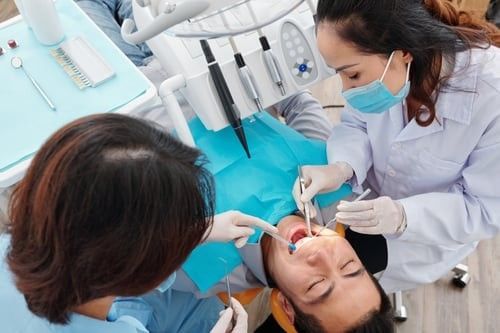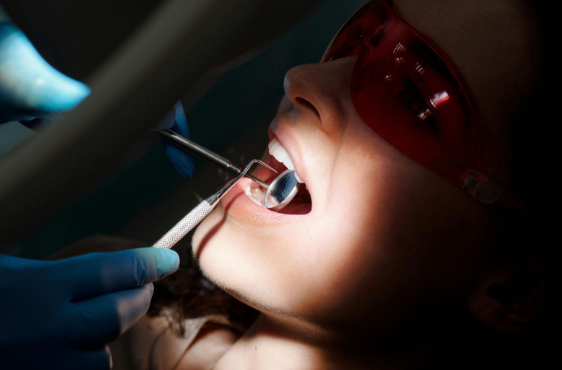Gateway Family Dental Blog
Pool Water and Your Teeth: How Chlorine Can Affect Your Dental Health

Swimming is a popular and refreshing way to stay fit and cool during warmer months. However, frequent exposure to chlorinated water can lead to unexpected dental issues if not properly managed. Understanding the effects of chlorine on your teeth can help protect your smile year-round.
Understanding Chlorine in Pool Water
Chlorine is a powerful disinfectant that plays a crucial role in keeping swimming pools safe from harmful bacteria. However, the same chemical that protects swimmers can also create an acidic environment that may pose a risk to dental health.
What Is Chlorine and Why Is It Used?
Chlorine helps maintain a hygienic pool by killing bacteria, algae, and other pathogens that can cause contamination. It's a standard treatment in both public and private pools, but must be carefully monitored to remain effective and safe.
How Chlorine Affects the Pool's pH Level
The chemical balance of a pool, especially its pH, determines whether chlorine will protect or potentially harm swimmers. When chlorine levels are too high or too low, the water’s pH can become unbalanced, often resulting in increased acidity that affects tooth enamel.
The Dental Impact of Chlorinated Pool Water
Regular exposure to chlorinated water can lead to several oral health concerns, including enamel erosion and aesthetic changes. The severity often depends on swimming frequency, duration of exposure, and the pool’s chemical balance. Because pool water isn't regulated with dental health in mind, improperly maintained water can pose risks that accumulate over time.
Enamel Erosion: The Silent Damage
When the pH of pool water drops too low, it becomes acidic and begins to dissolve the enamel—the protective outer layer of your teeth. This erosion can lead to increased tooth sensitivity, greater vulnerability to decay, and even visible changes like rounded or translucent edges. Unlike cavities caused by bacteria, enamel erosion is a chemical process, and once the enamel is lost, it does not regenerate.
Swimmer’s Calculus: A Chlorine-Related Phenomenon
Swimmer’s calculus refers to a hardened, yellow-brown deposit that can form on the front surfaces of teeth. It develops when chlorine reacts with proteins in saliva, altering its chemical composition. This buildup is especially common among competitive swimmers and is resistant to brushing, often requiring professional cleaning to remove. If left untreated, it can contribute to gum irritation or periodontal problems.
Tooth Discoloration and Aesthetic Concerns
Chlorine and other pool chemicals can also stain teeth over time, especially in those who swim frequently. These stains may appear as dark or yellow patches and are often resistant to standard whitening toothpaste. Addressing such discoloration usually involves cosmetic dental procedures like professional whitening or enamel polishing to restore the natural appearance of your teeth.
Who Is Most at Risk?
Not all swimmers are equally affected by chlorine-related dental issues. Certain groups are more vulnerable due to frequency of exposure and age-related factors.
Competitive and Recreational Swimmers
Swimmers who train multiple hours per week are at heightened risk of dental erosion and staining. Their teeth are frequently exposed to chemically treated water, which increases the chance of cumulative damage.
Children and Teenagers
Young swimmers may be more susceptible due to softer enamel and less consistent oral hygiene routines. Since their teeth are still developing, they require extra attention and care to avoid long-term effects.
Preventive Measures to Protect Your Teeth
While swimming doesn’t need to be avoided, proper dental habits and protective strategies can help reduce or eliminate the risk of chlorine-related damage. Prevention starts with awareness and proactive care.
Regular Dental Checkups
Scheduling dental visits every six months allows professionals to detect and address any early signs of enamel wear or tartar buildup. Preventive treatments like fluoride applications can strengthen teeth against acid exposure.
Practice Proper Oral Hygiene
Daily brushing with a fluoride toothpaste and consistent flossing are essential habits for all swimmers. Adding a fluoride mouth rinse after swimming can further help remineralize enamel and combat chlorine’s effects.
Use a Custom Mouthguard
A mouthguard can act as a barrier between your teeth and the pool water, especially for competitive swimmers. Your dentist can create a custom-fit version that’s comfortable and effective during training.
Shower and Hydrate
Rinsing off before and after swimming helps reduce chemical exposure on your body and in your mouth. Staying hydrated also keeps your saliva flowing, which plays a key role in neutralizing acids and protecting enamel.
What to Do If You Notice Changes in Your Teeth
If you start experiencing tooth sensitivity, discoloration, or visible tartar near the gumline, it's important to act quickly. These could be signs of chlorine-related dental effects that are easier to manage when caught early.
Consult Your Dentist Promptly
A dental evaluation can help determine if your symptoms are related to pool exposure or another underlying issue. Dentists can offer solutions such as enamel-strengthening treatments or professional cleanings to reverse early damage.
Consider Pool Testing and Maintenance
If you own a pool or swim at a private facility, regular testing of chlorine and pH levels is essential. Keeping water balanced ensures both swimmer safety and protection from potential dental and skin irritants.
Noticing tooth sensitivity or discoloration after frequent swimming? Our experts at
Gateway Family Dentistry are here to help protect your smile. From cleanings to enamel care, we offer personalized treatments to keep your teeth healthy.
Schedule your appointment today and protect your dental health year-round.




